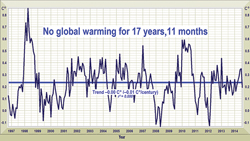Oil and gas in the capitals
|
On July 29, the White House released “The cost of delaying action to stem climate change,” prepared by its Council of Economic Advisers (CEA). The report argues that delaying expensive, intrusive measures to mitigate climate change will only cost more in the long run. It is intended to facilitate actions that President Obama is proposing to address global warming—actions with serious consequences for the oil and gas industry. The report is part of a White House effort to increase public support for Obama’s energy agenda and new EPA regulations.
The report contends that failing to reduce CO2 emissions could cost the U.S, economy $150 billion/year, and that costs will increase 40% for each decade that we delay. The CEA reached its conclusions using “meta-analysis,” which aggregated results from different studies conducted with integrated assessment models. CEA Chair Jason Furman stated, “At this stage, there’s no doubt that climate change is real, that it’s being caused by our activity, that it’s harming the planet, and affecting our livelihood. What this report makes clear is, first of all, that we know way more than enough to justify acting today; second, that delaying action will increase the cost; and third, the uncertainty of the risk is an argument for acting today as a form of insurance against the worst consequences in the future.” However, the report is inaccurate and misleading. Even a cursory reading reveals numerous factual errors and statements that are demonstrably false. Consider just the following examples. The report states, “The average temperature in the U.S., and globally, is increasing.” No: According to the Remote Sensing System (RSS) satellite record, there has been no temperature increase for the past 18 years—see the chart on this page. Further, there are indications that temperatures are actually decreasing, and that we may be entering a long-term cooling cycle. The report states, “Global warming caused recent extreme weather.” No: First, there has been no warming recently, so it cannot have caused any extreme weather. Second, even though weather and storm detection measures have improved markedly in recent decades, there is no indication of increased tornadoes, hurricanes, drought, snowfall, or other extreme weather events. In fact, extreme weather events have decreased over the past century. “Global sea levels are currently rising at approximately 1.25 inches per decade, and the rate of increase appears to be accelerating.” No: Some studies show sea levels rising a little, while others show them falling. However, most empirical evidence indicates that sea levels have been stable for at least the past half-century. The report states, “The scientific consensus is that these changes are largely consequences of anthropogenic emissions of greenhouse gases.” No, the “scientific consensus” is a manufactured myth, and only 0.5% of 12,000 scientific papers on climate over the past 21 years agreed that most of the warming since 1950 was man-made. Even aside from the notorious examples of Galileo and Einstein overturning established scientific “truth”—and being rejected by the “consensus”—consider more recent examples: 1) Alfred Wegener hypothesized “continental drift” in 1912 and was ridiculed until proven correct, decades later; and 2) in 1982, Stanley Prusiner’s report, that Mad Cow disease was caused by a virus-like protein, was ridiculed by the scientific establishment. Yet, he was awarded the 1997 Nobel Prize for medicine, for his discovery. CEA’s report states, “Any short-run gains from delay tend to be outweighed by the additional costs arising from the need to adopt a more abrupt and stringent policy later.” No: It is much more costly to incur huge expenses, now, on the basis of flawed science. The report states, “There is a vigorous public debate over whether to act now to stem climate change or instead to delay implementing mitigation policies until a future date.” No: The debate is over whether to act at all, given the lack of convincing scientific evidence. Most pathetically, the CEA report cites various “experts” to validate its findings. However, many of the experts cited are scathing in their criticism of the assumptions and implications of the report—even the sources cited for verification in the report actually disagree with it. The report argues that “climate policy can be thought of as ‘climate insurance,’ taken out against the most severe and irreversible potential consequences of climate change.” However, climate mitigation policies cannot legitimately be considered to be insurance. In addition, likely damages from climate change are actually less than the costs of government actions to reduce CO2 emissions. Actually, it is sad. Over the years, I have worked with CEA economists on numerous projects relating to energy, economics and finance. I always found them to be competent and objective, regardless of political party. I am thus greatly disappointed to find that CEA staff could produce such a flawed, biased, “politically correct” document. CEA should be embarrassed to have its name on this report. |





